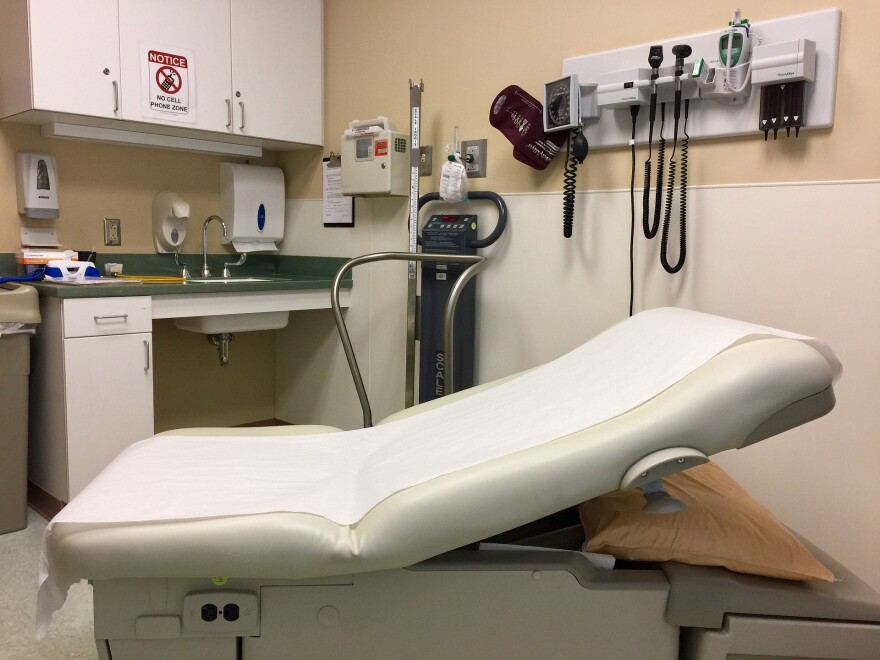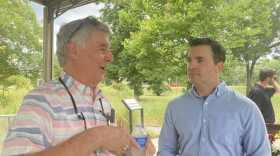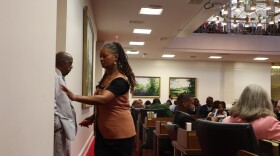This weekend, the radio show "Reveal" is looking at the challenges an abortion provider in North Carolina faces after state lawmakers last year banned most abortions after 12 weeks. And it’s not just abortion clinics in North Carolina facing challenges. Clinics across the South are facing further restrictions in the wake of Roe v. Wade being overturned.
Reporter Laura Morel has spent almost a year working on the story. She joins me now to talk more about it.
Marshall Terry: So your reporting centers on Kelly Flynn, who operates A Woman’s Choice clinics in Charlotte, Greensboro, and Raleigh. Tell me more about her and why you decided to focus on her and her clinics.
Laura Morel: Sure, she has worked as an abortion provider in the South for nearly 30 years and, like you said, she owns three clinics in North Carolina. She also owns one in Florida, and these are both states that were once bastions of abortion access for the South. But in the aftermath of Roe, both states have passed laws to severely restrict abortion. North Carolina now has a 12-week ban. Florida has a 15-week ban, with a possible six-week ban on the horizon. So, when the 12-week ban in North Carolina went into effect last year. She really wanted to find a closer place for those patients to go because she was sending them to Florida, which, you know, of course, you have to fly there or, you know, drive for a really long time. So, her solution was to open a new clinic in Virginia.
Terry: And I’m going to ask you about that clinic in just a moment. But first, we have a little bit of Flynn talking about just how quickly things can change:
“This work is so unpredictable and from day to day you don’t know what could happen in terms of regulations change, laws change. Then you have to shut your clinic down in the middle of the day because they passed a bill at a 2 o’clock hearing.”
So how does she navigate that unpredictability?
Morel: One thing she told me is that she focuses on what she can control and for her right now, you know, what she can control is the fact that Virginia might be the only state geographically in the South that will have the most abortion access. Knowing that, her decision was to open this new clinic in that state because she knew that immediately it would help her North Carolina patients and then just sort of long-term planning, we don't know what's going to happen in Florida. We might have a six-week ban in place. There's also a ballot initiative to get abortion on the ballot in November, that's also happening. So, there's a lot of uncertainty in Florida. So, the thing that Kelly can do right now is just sort of prepare and find a way to help her patients as much as she can.
Terry: Now as you mentioned she did open up this new clinic in Virginia. It’s in Danville, and for those who don’t know Danville is very close to the North Carolina state line. And Virginia’s abortion law is much less restrictive than North Carolina's, right?
Morel: That's correct. They go up to 24 weeks. The other thing that’s of note in Virginia is that there's no waiting period to get an abortion. For example, Florida has a 24-hour waiting period. North Carolina has a 72-hour waiting period and what that means in North Carolina is that patients have to go twice to the clinics where they are getting medical care. The first time is to sign some consent forms and then they have to come back 72 hours later for the procedure. As you can imagine, that causes a lot of challenges for people who have to take time off of work and find childcare and take time off of school to be able to make it to these appointments. So that's another advantage of being an abortion provider in Virginia right now, is that you can see patients without these additional barriers.
Terry: And you spoke with one person who opposes this idea of so-called abortion tourism, where people travel to another state to have a procedure. She is Victoria Cobb with the Family Foundation of Virginia:
“People don’t want to see a commercial that says, ‘come to Virginia, visit historic Williamsburg and get your abortion while you’re here.’ That’s not any community’s desire. And so that’s what these communities are trying to do is wall off being exploited by the abortion industry.”
What exactly are those communities doing?
Morel: So, Victoria works with the Family Foundation of Virginia, and they've been advocating and working with some local communities on crafting zoning ordinances that would essentially block abortion clinics from ever opening in these communities. These are sort of preemptive efforts, especially knowing Virginia's growing status as an abortion access state in the South. The clinic in Danville has not faced any local opposition, but there has been at least one other clinic in Virginia, in the Bristol area in particular, who did face legal challenges. But that zoning ordinance in Bristol has not gone into effect yet.
Terry: So it's unpredictable for clinic operators. But what did you hear from women about what it's like to go to one of these clinics? Are they typically confronted by protestors?
Morel: Yeah so, I've talked to patients the last couple years while I've been reporting on reproductive health and protesters really posed, sort of like, a final barrier for these patients. Like I mentioned earlier, especially if you're a patient coming from out of state, you're already paying a lot of money to get a flight or you're paying money on gas to drive how many hours it will take you to get there. You're arranging childcare or time off of work, and then finally getting to the place where you have your appointment and then having to face protesters. It can also be disruptive to clinics themselves, just sort of having a lot of noise pollution outside of these clinics, that has caused a lot of challenges too.
Terry: So, Mark Robinson, the Republican nominee for governor in North Carolina, has likened abortion to murder. Donald Trump, the presumptive Republican nominee for President, has reportedly expressed support for a national 16-week ban. What are the people you talked to worried about, or hopeful for, in the year to come?
Morel: Well, I think for Kelly, in particular, and for abortion providers, not just in Florida, but the rest of the South, there's a lot of momentum behind this ballot initiative in Florida right now, the fact that voters might be able to vote on restoring abortion in the state of Florida. That would have a big impact not just for Floridians but for the rest of the South because it would mean that out-of-state patients could continue coming to Florida for care. So, I think that's something that a lot of people are waiting for, to see what will happen. And I think, as Kelly told me in my interviews with her, is just you sort of have to like just control what you can control, right, and, you know, keep an eye on things that are changing. And that's unfortunately what the landscape of abortion access looks like right now.
Morel is a reporter at "Reveal," a radio show and podcast co-produced by PRX and The Center for Investigative Reporting (CIR). "Reveal" features CIR's reporting, as well as stories from public radio stations and a wide range of media partners, both nonprofit and commercial.
You can hear "Reveal" on Sundays at 2 p.m. on WFAE. Find our full programming schedule here.







